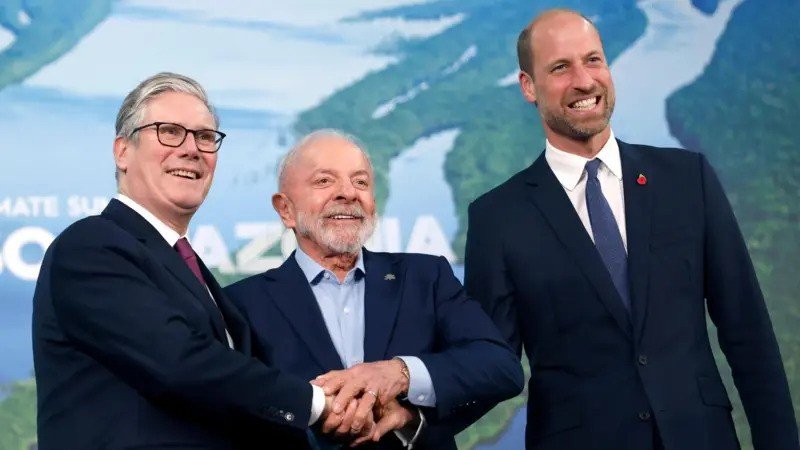
First Day of COP30 Leader Summit
Belém, Brazil – November 6, 2025 - The 30th session of the United Nations Climate Change Conference (COP30) kicked off in Belém on Thursday, beginning with a high-stakes Leaders Summit that set the tone for what organizers hope will be a more action-oriented phase in global climate diplomacy. Heads of state and government, climate ministers and civil society representatives gathered in the Amazonian city under the shadow of mounting scientific warnings and palpable geopolitical strain.
High-level mood and key messages
At the opening, António Guterres, Secretary-General of the United Nations, delivered blunt remarks: the failure to keep global warming within 1.5 °C is “a moral failure and deadly negligence” — and warned even a temporary overshoot could trigger catastrophic tipping-points, mass displacement and heightened global security risks.
He accused fossil-fuel companies of profiting from devastation and obstructing progress, adding that the world’s current trajectory points toward 2.3 °C of warming, far from the Paris Agreement’s aspirational goal.
Brazilian President Luiz Inácio Lula da Silva described Belém as the “COP of truth,” emphasizing that there can be no solution for the climate crisis without also tackling inequality. He highlighted Indigenous rights and forest preservation as central to the success of this summit.
New Initiatives
One of the headline announcements was Brazil’s launch of the “Tropical Forests Forever Facility”, a new fund aiming to mobilize tens of billions of dollars for forest conservation across developing countries. Norway pledged roughly USD 3 billion over 10 years, with France and others signalling follow-up.
Another milestone agreement secured on the opening day commits to legal recognition of Indigenous and traditional community land tenure — covering more than 160 million hectares by 2030. Indigenous leaders and forest-dependent communities were elevated as key partners in climate action.
Tensions & gaps: Who’s missing, what’s uncertain
Despite the ambitious rhetoric, realities show cracks in the global consensus. Key players — notably the United States, China, India and Russia — were absent from the opening high-level sessions or sent lower-level delegates, raising questions about how unified the summit will be.
Observers note that while the summit aims for a significant push on ambition, delivery remains a concern. Current national climate pledges (NDCs) fall well short of what is needed to keep the 1.5 °C target alive — meaning operational outcomes in finance, adaptation and mitigation must be robust.
Finance & adaptation on the agenda
Climate finance once again looms large. One of COP30’s central challenges is scaling up funding from the current baseline toward the goal of USD 1.3 trillion per year by 2035. As one think-tank analysis notes: “A successful COP in Belém would deliver concrete outcomes in finance, loss and damage funding, emissions reductions and adaptation indicators.”
In parallel, adaptation is being debated as a core pillar. Belém is being framed as the “COP of adaptation”, with a push to finalize global indicators for progress and scale up support for highly vulnerable countries.
Local logistic hurdles
Even logistics reflect underlying stress: a construction workers’ strike in Belém disrupted preparations for the Leader Summit’s “Leaders’ Village”, affecting accommodation and infrastructure in the lead-up to the event.
Implications for Bangladesh
For Bangladesh and other climate-vulnerable countries, the summit holds critical implications:
• The emphasis on adaptation and forest/land rights aligns with priorities of nations facing extreme climate impacts.
• The finance gap remains a pressing concern: if developed countries do not deliver, Bangladesh’s ability to meet its NDC and adaptation goals could be compromised.
• The summit’s ability to convert announcements into operational commitments (land, funding, technology, capacity-building) will be a key litmus test.
• Private sector and innovative financing mechanisms are likely to gain more prominence, given strains on traditional public funding.
Outlook & what to watch
As COP30 unfolds, key items to monitor include:
• Named contributors and concrete targets for new climate finance, particularly for loss & damage, adaptation and mitigation.
• Progress on the Global Goal on Adaptation (GGA) and whether a set of usable global adaptation indicators is agreed.
• Response to the absence or low-level representation of major emitters, and how this affects consensus-building.
• Details of Brazil’s forestry fund and whether additional large pledges follow the opening announcements.
• Accountability and transparency mechanisms: how will funding be tracked, how will private sector and innovative finance sources be mobilized?
Day One Funding pledges
• The flagship initiative Tropical Forests Forever Facility (TFFF) was unveiled. It has drawn support from multiple countries and commitments including a US$3 billion pledge from Norway, US$1 billion each from Brazil and Indonesia, and €500 million from France.
• The official summit brief confirms these early funding pledges and cites the TFFF as “fully operational for contributions” as of Day 1.
• In addition, Brazil has issued sustainable bonds worth US$1.5 billion and another US$750 million retap, timed right ahead of COP30, signalling its domestic commitment to sustainable financing.



